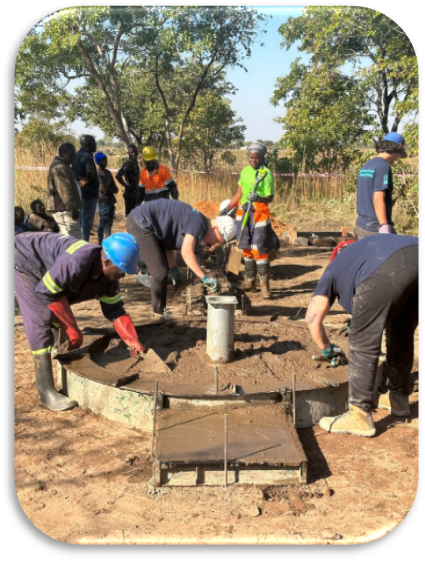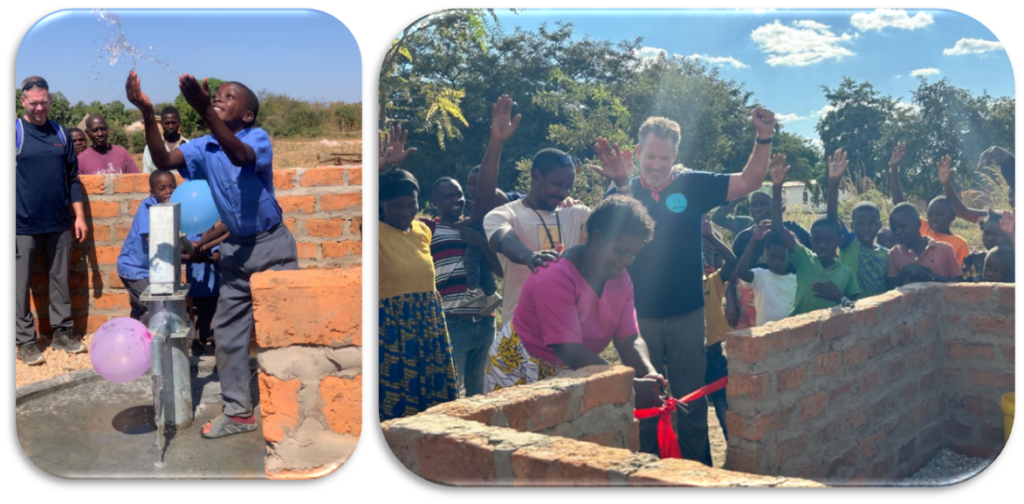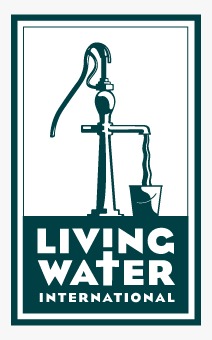Living Water Zambia recently had the pleasure of hosting two groups of Living Water Trip participants at the WPA office in Chibombo District, Central Province. The first trip occurred from May 5th to 10th, and the second from May 26th to June 1st, 2024. These visits were more than just mere tours; they were immersive experiences showcasing the profound impact of our mission to spread the gospel of Jesus Christ by providing clean and safe water to those in greatest need.
The first group of Trip participants comprised four individuals, while the second group included thirteen people. The primary objective of these trips was to offer the Trip participants a unique opportunity to engage deeply with the community and observe firsthand the comprehensive process of our water projects—from the initial drilling of a well to its completion and the ceremonial handover to the community.

A key highlight of both visits was the participation in community engagement activities. The Trippers were not mere spectators; they actively took part in the commemoration of Menstrual Hygiene Day. This national event is crucial for raising awareness about good menstrual hygiene practices, particularly in rural areas where such knowledge is often scarce. The Trippers’ involvement underscored the holistic approach of Living Water International in addressing not just the need for clean water, but also the broader health and hygiene issues faced by communities.
One of the most memorable moments was the dedication ceremony of a rehabilitated well at Mutesha Primary School in Chibombo. The school’s Head Teacher shared a poignant story of how the institution was on the brink of closure due to the lack of water.
“Teachers frequently left because of this critical shortage, leaving only five to manage over 600 pupils. The school and surrounding community had been relying on a hand-dug well over a kilometer away after their hand pump broke down. The intervention by Living Water Zambia not only restored the well but also revitalized the entire community.”
This story deeply resonated with the Trip participants, highlighting the life-changing impact of their support.
Another impactful moment was the visit to Musopelo village, where a new well was being completed. Previously, the village’s 252 residents relied on hazardous hand-dug wells, which posed significant risks to both children and women. The makeshift tools used, including a stick attached to a bucket, were unsafe and prone to accidents. The village headman expressed profound gratitude to Living Water Zambia, noting that the well arrived just in time as ongoing droughts due to climate change threatened to dry up their previous water sources. This new well would provide the community with safe and clean drinking water, averting a potential crisis.
Feedback from the Trip participants was overwhelmingly positive. They expressed deep appreciation for the detailed step-by-step process of well drilling and the kindness and support of the Living Water staff. The spiritual upliftment experienced through interactions with local community churches was another significant highlight. The Trip participants valued the responsibilities entrusted to them and the opportunities to collaborate with local communities. They cherished the vibrant interactions with different villages and churches, particularly enjoying the singing and dancing that marked these engagements.
These trips are invaluable for Living Water Zambia. They allow current and potential donors to witness the direct impact of their contributions, fostering a deeper connection to our mission. The genuine reactions from grateful beneficiaries validate our efforts and underscore the need for continued support. Additionally, the constructive feedback from Trip participants provides us with insights into areas for improvement, ensuring we continue to grow and enhance our impact.
In conclusion, the visits by these two groups of Trip participants were more than just tours; they were transformative experiences that underscored the critical work God is doing in Zambia. They reinforced the importance of safe water and good hygiene practices while fostering a deeper connection between donors and the communities they support. As we continue our mission, such visits remain a testament to the profound impact of our work and the enduring need for safe water.


